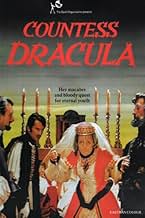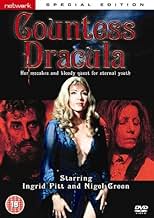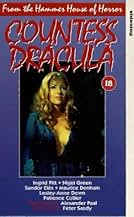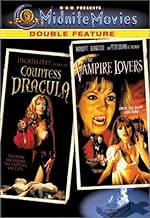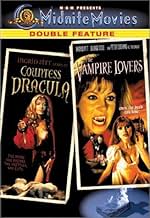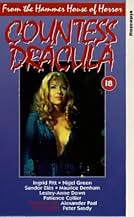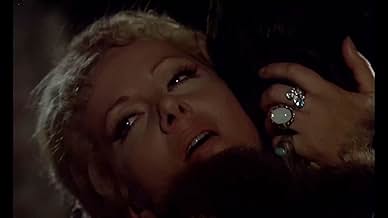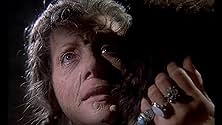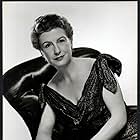IMDb RATING
5.9/10
5.1K
YOUR RATING
In 17th-century Hungary, elderly widow Countess Elisabeth Nádasdy maintains her misleading youthful appearance by bathing in the blood of virgins regularly supplied to her by faithful servan... Read allIn 17th-century Hungary, elderly widow Countess Elisabeth Nádasdy maintains her misleading youthful appearance by bathing in the blood of virgins regularly supplied to her by faithful servant Captain Dobi.In 17th-century Hungary, elderly widow Countess Elisabeth Nádasdy maintains her misleading youthful appearance by bathing in the blood of virgins regularly supplied to her by faithful servant Captain Dobi.
Andria Lawrence
- Ziza
- (as Andrea Lawrence)
Featured reviews
Shocking, poetic, well-done story loosely based on the legend of Countess Bathory of Hungary who, it is said, bathed in the blood of young virginal women for the purposes of rejuvenating her skin. Ingrid Pitt plays the countess in all her ugly old age and her fresh nubile new skin. Actually, Pitt does a very good job in a very difficult role of playing two women incredibly apart in age that are supposed to be the same woman. The direction is done by Peter Sasdy, probably the best of Hammer's latter directors, who did a very good job with Taste the Blood of Dracula and Hands of the Ripper. Sasdy knows how to use his camera and can be quite lyrical with it. Some of the scenes are very fresh and inventive. One that stands out is where Pitt returns to her ugliness and all the action of her inner turmoil is seen through some broken lattice. Quite good! Too bad that Hammer had by this time gone to that inferior film stock. This would have been simply gorgeous had it been done five years earlier. Also, by this time, Hammer had to rely on more blood and violence and more exposed bosoms. Countess Dracula is at times quite bloody, with the pinnacle I think being the scene where Pitt is actually caught unawares bathing in blood and massaging her nude bodice with a blood-soaked sponge. Nonetheless the violence really does not detract too much from a pretty good story and execution of it. Nor does the nudity, albeit it rather unnecessary(Andrea Lawrence is quite "charming" in her role as a serving girl...no pun intended). The rest of the cast is very good with Nigel Green really giving a nice performance as a jealous lover and Maurice Denham excelling as a dotty old man. The film stands as a testament to the extremes some people will go through to recapture what was past, and their self-centered, self-serving drive to remain beautiful and young. Is it topical today? You bet ya!
The story of Elizabeth Bathory is easily one of the most important for the horror genre, and there's no studio more qualified to tackle said story than the legendary Hammer studios...but unfortunately, the resulting film is not as great as it could have been. Hammer had their golden period from the late fifties until the end of the sixties, and I dare say that if this film was released during that period, it would have been one of their classics. By the seventies, the studio had began to take influence from the lurid Euro horror films that were gaining popularity, and this resulted in Hammer losing it's innocence; which if you ask me, was what made them great in the first place. However, Countess Dracula is still one of Hammer's most inspiring films and benefits from a typically ludicrous plot line. We follow the Countess who, by chance, discovers that the blood of virgins restores her youth. After becoming young again, she pretends to be her own daughter and begins courting the son of a soldier; much to the annoyance of her present lover. However, nothing lasts forever; and bathing in the blood of virgins is something the Countess must continue to do if she is to retain her vanity
As mentioned, the way that the plot is handled isn't very good. The film plays out like a drama rather than a horror movie and there is barely any tension or suspense to found throughout the whole picture. It seems that director Peter Sasdy (who also made the very decent Taste the Blood of Dracula for Hammer) thought that the implications of the plot would be enough to carry it; and while this is true to an extent, the film does become a little too dreary at times. Another disappointing element of the film is that, despite the fact that it's about a woman who bathes in blood; we never actually get to see this taking place. I was really hoping to see the beautiful Ingrid Pitt relaxing in a bath of blood, but no! I don't know, perhaps it would have been a little too graphic. The lead actress really does make the film her own, however and delivers a powerhouse performance that proves her worthy of the title of Hammer's best leading lady. The way that the film carries off the plot is really good, also, and we are allowed into the head of all three central figures. On the whole, I can't say that this is one of Hammer's best films, but despite its faults; I really enjoyed it.
As mentioned, the way that the plot is handled isn't very good. The film plays out like a drama rather than a horror movie and there is barely any tension or suspense to found throughout the whole picture. It seems that director Peter Sasdy (who also made the very decent Taste the Blood of Dracula for Hammer) thought that the implications of the plot would be enough to carry it; and while this is true to an extent, the film does become a little too dreary at times. Another disappointing element of the film is that, despite the fact that it's about a woman who bathes in blood; we never actually get to see this taking place. I was really hoping to see the beautiful Ingrid Pitt relaxing in a bath of blood, but no! I don't know, perhaps it would have been a little too graphic. The lead actress really does make the film her own, however and delivers a powerhouse performance that proves her worthy of the title of Hammer's best leading lady. The way that the film carries off the plot is really good, also, and we are allowed into the head of all three central figures. On the whole, I can't say that this is one of Hammer's best films, but despite its faults; I really enjoyed it.
Based on true history of Hungary's early 17th Century, Countess Elizabeth Bathory, Hammer Film's, "Countess Dracula" was meant to be entertaining historic horror, with no aspirations towards anything more or higher. In this entertainment aspect, regardless of lovely actress Ingrid Pitt's considerable feminine endowments, "Countess Dracula" succeeded. If one could fault Hammer Films for anything, it would be its blatant inaccurate film title, which was a transparent marketing ploy to capitalize on the studio's heretofore financially successful vampire horror films.
Nonetheless by reading all the subsequent readers' comments herein, one consistently encounters complaints on "Countess Dracula's" purported shortcomings in plot, acting talent, budget, sets quality, etc., as if the critics were evaluating a multi-million dollar budgeted aspiring blockbuster. Hammer Films execs wanted its viewers to come away entertained by this film. If you watched, "Countess Dracula" and came away entertained, amused, or disturbed then everyone got someone and should be happy.
I won't rehash old observations expounded upon in previous viewers' comments as I have similar ones so I will offer new comments.
One or two viewers previously commented on the horrible aging makeup of Ingrid Pitt/Countess Nodosheen. My new observation beyond this is that in real life, the countess would not have actually looked like an aging grandmother.
Bear in mind that back in circa 1600 AD, young women married at the age of 15 or 16 and quickly bore children soon after. If my history is correct, the real Countess Bathory married at age 16. Assuming bearing a child at age 17, by the time the 18-year old Lesley Anne-Downe/Ilona Nodosheen appears on scene, the movie's Countess Nodosheen should have been only 34 or 35 years old. It would have been possible for the early-thirties Countess Nadosheen to still have appeared relatively attractive. Don't forget that as a wealthy aristocrat the countess would have had a superior diet and nutrition compared to the peasants, would not have had to work outdoors at hard labor, and had access to far better medical service, albeit primitive as it would have been back then. You can imagine an attractive 34 year old woman today being sexually attracted to a handsome, 22-24 year old man, which the young lieutenant Imre Toth was supposed to be.
Sandor Eles, the ill-fated lieutenant Imre Toth, deserves much better treatment in his thankless role than the critics of this viewers' board gave him. His character was not afforded that much dimension to begin with because that is how the film's director envisioned it. Toth is a tragic, innocent victim, and was not meant to be the film's hero requiring cunning, nerves of steel, fighting talent, so forth. I actually felt great sympathy for the Toth character. In the film LT Toth is a real nice guy, of above average intelligence, but no genius, a typical young man filled with visions of military achievement and glory. There is no man who in the same position would not be able to resist the attentions and sexual blandishments of a beautiful woman. We would all fall into the same trap. That is why the Toth character elicits sympathy. He could be any one of us normal guys.
Another observation is in line. The rejuvenated Countess Nodosheen is supposed to look 18-19 years old. But in the film Ingrid Pitt looks older than Sandor Eles/Imre Toth. She looks more like a woman in her late 20's possibly already 30. I attribute that slip-up to the director. It's no fault of Ingrid Pitt. That's how Pitt looked like back in 1970.
One more observation. Did anyone notice that when Countess Nodosheen regained her youth temporarily, her disposition and temperament dramatically improved as well? As an old crone, the countess is dour and mean-spirited. Rejuvenated to around 18 years of age, the now pretty countess smiles a lot, laughs, tells jokes, and is generally much better company to be around. Only twice does the connivance of the elder countess resurface and then in a sexy, bitchy, "Dallas/Dynasty" sort of a way. The elder/younger countess transformation, reminiscent of Dr. Jekyll/Mr. Hyde, seems to be reaching towards an allegory of good and evil co-existing within the same person.
In my opinion, this is where the inexplicable sympathy for the Ingrid Pitt/Countess Nodosheen character originates. If you watch "Countess Dracula" several times as I have done, you begin to perceive something of a Greek tragedy in the character, maybe MacBeth-like. An elderly aristocrat falls in love with a youthful man she knows she can never have, nor should have. But she circumvents her destiny and age by invoking black magic and murder. The results only ultimately mock her true age and bring misery and death to everyone around her.
Oddly, no one in "Countess Dracula" starts off evil. True, elderly Countess Nodosheen is selfish, mean-spirited, discourteous, and short-tempered, but she doesn't embark upon her amoral path of self-gratification, fornication, and murder until she accidentally discovers the "secret" of youth.
The excellent Nigel Green/Captain Dobi character doesn't start off evil, either, despite being a true SOB. Captain Dobi actually tries his best to dissuade the countess from her path of self-deceit and murder. He appears to truly love the elderly countess at her present age and appearance because they shared a love affair years ago. Captain Dobi predicts with grim accuracy the madness and obsession the countess would descent into should she insist on achieving and maintaining a false appearance of youthful beauty. Captain Dobi's love for the countess is unrequited and in the end betrayed. He allows himself to be dragged down into the same web of deceit and heinous murder.
The countess' trusted nurse/servant, Julie, a very nice, dedicated, and even 'good' character, descends into being an accomplice and an 'enabler'. Hence, the countess' final self-destruction ensnares all, good and bad, around her. Tell me that this doesn't bear some passing resemblance to a character Greek tragedy.
Nonetheless by reading all the subsequent readers' comments herein, one consistently encounters complaints on "Countess Dracula's" purported shortcomings in plot, acting talent, budget, sets quality, etc., as if the critics were evaluating a multi-million dollar budgeted aspiring blockbuster. Hammer Films execs wanted its viewers to come away entertained by this film. If you watched, "Countess Dracula" and came away entertained, amused, or disturbed then everyone got someone and should be happy.
I won't rehash old observations expounded upon in previous viewers' comments as I have similar ones so I will offer new comments.
One or two viewers previously commented on the horrible aging makeup of Ingrid Pitt/Countess Nodosheen. My new observation beyond this is that in real life, the countess would not have actually looked like an aging grandmother.
Bear in mind that back in circa 1600 AD, young women married at the age of 15 or 16 and quickly bore children soon after. If my history is correct, the real Countess Bathory married at age 16. Assuming bearing a child at age 17, by the time the 18-year old Lesley Anne-Downe/Ilona Nodosheen appears on scene, the movie's Countess Nodosheen should have been only 34 or 35 years old. It would have been possible for the early-thirties Countess Nadosheen to still have appeared relatively attractive. Don't forget that as a wealthy aristocrat the countess would have had a superior diet and nutrition compared to the peasants, would not have had to work outdoors at hard labor, and had access to far better medical service, albeit primitive as it would have been back then. You can imagine an attractive 34 year old woman today being sexually attracted to a handsome, 22-24 year old man, which the young lieutenant Imre Toth was supposed to be.
Sandor Eles, the ill-fated lieutenant Imre Toth, deserves much better treatment in his thankless role than the critics of this viewers' board gave him. His character was not afforded that much dimension to begin with because that is how the film's director envisioned it. Toth is a tragic, innocent victim, and was not meant to be the film's hero requiring cunning, nerves of steel, fighting talent, so forth. I actually felt great sympathy for the Toth character. In the film LT Toth is a real nice guy, of above average intelligence, but no genius, a typical young man filled with visions of military achievement and glory. There is no man who in the same position would not be able to resist the attentions and sexual blandishments of a beautiful woman. We would all fall into the same trap. That is why the Toth character elicits sympathy. He could be any one of us normal guys.
Another observation is in line. The rejuvenated Countess Nodosheen is supposed to look 18-19 years old. But in the film Ingrid Pitt looks older than Sandor Eles/Imre Toth. She looks more like a woman in her late 20's possibly already 30. I attribute that slip-up to the director. It's no fault of Ingrid Pitt. That's how Pitt looked like back in 1970.
One more observation. Did anyone notice that when Countess Nodosheen regained her youth temporarily, her disposition and temperament dramatically improved as well? As an old crone, the countess is dour and mean-spirited. Rejuvenated to around 18 years of age, the now pretty countess smiles a lot, laughs, tells jokes, and is generally much better company to be around. Only twice does the connivance of the elder countess resurface and then in a sexy, bitchy, "Dallas/Dynasty" sort of a way. The elder/younger countess transformation, reminiscent of Dr. Jekyll/Mr. Hyde, seems to be reaching towards an allegory of good and evil co-existing within the same person.
In my opinion, this is where the inexplicable sympathy for the Ingrid Pitt/Countess Nodosheen character originates. If you watch "Countess Dracula" several times as I have done, you begin to perceive something of a Greek tragedy in the character, maybe MacBeth-like. An elderly aristocrat falls in love with a youthful man she knows she can never have, nor should have. But she circumvents her destiny and age by invoking black magic and murder. The results only ultimately mock her true age and bring misery and death to everyone around her.
Oddly, no one in "Countess Dracula" starts off evil. True, elderly Countess Nodosheen is selfish, mean-spirited, discourteous, and short-tempered, but she doesn't embark upon her amoral path of self-gratification, fornication, and murder until she accidentally discovers the "secret" of youth.
The excellent Nigel Green/Captain Dobi character doesn't start off evil, either, despite being a true SOB. Captain Dobi actually tries his best to dissuade the countess from her path of self-deceit and murder. He appears to truly love the elderly countess at her present age and appearance because they shared a love affair years ago. Captain Dobi predicts with grim accuracy the madness and obsession the countess would descent into should she insist on achieving and maintaining a false appearance of youthful beauty. Captain Dobi's love for the countess is unrequited and in the end betrayed. He allows himself to be dragged down into the same web of deceit and heinous murder.
The countess' trusted nurse/servant, Julie, a very nice, dedicated, and even 'good' character, descends into being an accomplice and an 'enabler'. Hence, the countess' final self-destruction ensnares all, good and bad, around her. Tell me that this doesn't bear some passing resemblance to a character Greek tragedy.
This Hammer horror made during the company's swansong years is based on the real life tale of the Hungarian Countess Bathory who bathed in the blood of young virgins in order to preserve her youth. Here the character has been renamed the Countess Nadasdy and is excellently portrayed by Ingrid Pitt. Director Peter Sasdy (who was Hungarian) manages to extract some period detail (not the pleasant kind) from the Jeremy Paul script such as the treatment of peasants by the aristocracy and he is aided by the rich lighting of Cinematographer Ken Talbot. Sasdy was without doubt one of the best Hammer or British horror film directors alongside Terence Fisher, Roy Ward Baker, Freddie Francis and John Gilling. Indeed Sasdy was the only other director than Terence Fisher who was able to relate the attitudes of society and the eerie atmospheric poetry to the vampire myth. While this is no criticism against Sasdy, it would of been interesting to see how Terence Fisher would have approached the film. The material would have given him many opportunities to place emphasis on character and setting, which was the main features of his style. Other delights include the able support from the always reliable Nigel Green who plays a faithful servant who supplies Pitt with suitable victims and Maurice Denham is fun as the ill-fated inquisitive librarian Master Fabio. The film has now been reissued on DVD with "Twins Of Evil" and "Vampire Circus" by Carlton as a box set entitled, "Hammer House Of Horror: The Vampire Collection".
This is a Hammer film production and the name Dracula is mentioned in the title, yet shouldn't raise any hopes to see Christoper Lee dressed up in women's clothing, as this is not another entry in the long-running Dracula-series! The screenplay of this movie is based on the life of Countess Elisabeth Bathory, who lived in Hungary during the 16th century, and became almost as (in)famous as Vlad Dracula because of her bizarre rituals to sustain a youthful appearance. The merciless countess bathed in the blood of slain virgins and supposedly was responsible for the death of more than 300 young girls. Naturally, this makes her an ideal villain and who other than the eminent Hammer Studios were more eligible to turn this legend into a compelling Gothic horror movie? Director Peter Sasdy and writer Alexander Paal added a lot of popular story lines, like a truckload of sexual intrigues and a neat display of corruption, but they also managed to sustain the morbidity of Bathory's persona. Ingrid Pitt, perhaps the most ravishing Hammer actress ever (see "The Vampire Lovers" for more evidence), is truly magnificent as the repellent countess who would even sacrifice her own daughter in order to maintain her virility. She has the loyal Captain Dobi and a bunch of household staff to obey her commands implicitly and a newly arrived stud to fall in love with. Regretfully, the film lacks balanced pacing and the set pieces too often look like discarded attributes from other Hammer films. There's a satisfying amount of bloodshed and sleaze and the abrupt ending comes as a genuine shock. "Countess Dracula" is perhaps not the most sensational horror movie of the early 70's, but it provides a welcome change in substance and it's definitely worth tracking down by all the fans of Gothic goodness.
Storyline
Did you know
- TriviaThe picture that appears behind the opening credits is an 1896 painting by Hungarian artist Istvan Csok. It shows the real Countess Bathory enjoying the torture of some young women by her servants. In an inner courtyard of one of her castles, the naked girls are being drenched with water and allowed to freeze to death in the snow.
- GoofsWhen the young boys in the forest discover the body of the girl, they run way and holler for help. In the next shot, the girl is breathing.
- Quotes
Captain Dobi: And what will your daughter say? She arrives tomorrow and she'll find you as young as she is.
- Alternate versionsAlthough cinema cuts were requested by the BBFC (and the film remains listed as cut on their website) the edits were never made following an appeal by Hammer to chief censor Stephen Murphy.
- How long is Countess Dracula?Powered by Alexa
Details
- Release date
- Country of origin
- Languages
- Also known as
- La condesa Drácula
- Filming locations
- Pinewood Studios, Iver Heath, Buckinghamshire, England, UK(studio: made at)
- Production companies
- See more company credits at IMDbPro
- Runtime1 hour 33 minutes
- Sound mix
- Aspect ratio
- 1.66 : 1
Contribute to this page
Suggest an edit or add missing content



